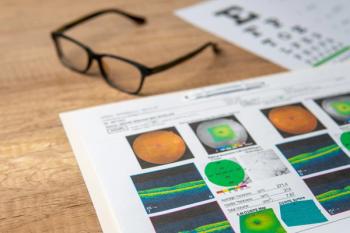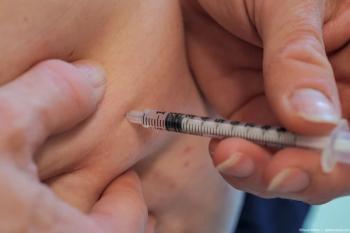
Patient education vs patient relations?
• Relatable patient education improves quality of care and prognosis • Although patients with moderate NPDR without DME can be followed every 6 to 9 months, when macular involvement is present patient needs more frequent follow-up • Patients with diabetic retinopathy need to be informed about importance of follow-up care even in the absence of their vision changes
The American Optometric Association’s Evidence-Based Clinical Practice Guideline for Patient with Diabetes Mellitusdedicates a section to patient education with specific recommendation and objectives.3 Most electronic health records (EHR) users have become accustomed to clicking a box to satisfy the standard and requirements now known by many designations such as Physician Quality Reporting System (PQRS), Quality Payment Program (QPP), and Merit-based Incentive Program System (MIPS) followed by printed material given to the patient.
How should ODs approach patient education in their busy practice days? Consider a “fit-for-all” or at least some degree of individualization based on the patient’s circumstances, including her level of comprehension of her condition. After all, which is more important: to satisfy MIPS or ensuring the best possible patient outcome? I know ODs will choose the latter.
Optometrists should think about patient relations in addition to patient education. For instance, often patients thank ODs for the care and services they provide. Do ODs as often thank their patients for their compliance and adherence to their care plan? Do ODs explain their diagnoses and treatment to them in a way that is relatable to develop a better relationship?
Case in point
A 65-year-old man with type 2 diabetes, marginal blood sugar control, and no visual complaints returns for his 3-month follow-up visit. This was his third follow-up visit as an established patient. He has moderate nonproliferative diabetic retinopathy (NPDR) without diabetic macular edema (DME; Figures 1 and 2).3
Although the recommended follow-up plan for such patient is every 6 to 9 months3 because he has macular involved disease (Figure 3), this patient has higher risk to develop DME resulting in vision loss. Therefore, he is being followed more frequently.
At the conclusion of his visit, I informed him about his findings remaining stable and still no treatment needed. I also discussed the importance of glycemic control and diabetes care recommendations and told him he needs to return in 3 months even if his vision stays the same.
Now, I can put myself in the patient’s shoes: He has just been told he has a condition that is the among most common causes of blindness, but I am not doing anything just other than watching it. So, to be fair and make sure he has clear understanding, I asked if he has any questions. He said he has one question: “So, Doc do I have to come see you for a long time?”
We all know the answer to this. Although a simple “yes” would have satisfied the answer, but this was not a legal deposition so a “yes” or “no” will not suffice. I often find analogies that compare clinical findings to some day-to-day experience to be helpful. They can backfire at times, but most patients get the point. On my toes, I had to come up with one of my “Rafisms,” as called by my colleagues.
I asked the patient, “Do you have car insurance?” With a puzzled look on his face, he said yes. I then asked, “How long have you been paying for car insurance?” I noticed he was more baffled, but said about 40 years. I then asked, “How many times in the past 40 years have you had to use your car insurance?” I think my nonsensical questions started to make sense to him. He replied, “Thankfully, only a couple of times.” I told him follow-up visits are like that: hopefully you never have to use it, meaning need for treatment. However, I told him the visits are a type of insurance to “save his sight.”
With that, he thanked me for my explanation and reassured me that he will be back in 3 months. I then thanked him for his understanding, trust, and compliance because his success or failure reflects on me as his eyecare provider.
Interlocked concepts
I am unsure if this dialog was patient education or developing patient relations. I think the two are interlocked. Patient education must be delivered in a way that is relatable and understandable by the patient and family members or those who help in the care of the patient. If ODs deliver this level of patient education, they also improve their relationships with the patient, with hopes to improve the patient’s adherence to his treatment as well as compliance with follow-up with declining or poor prognosis.
References
1. Abdelmotaal H, Ibrahim W, Sharaf M, Abdelazeem K. Causes and Clinical Impact of Loss to Follow-up in Patients with Proliferative Diabetic Retinopathy. J Ophthalmol. 2020 Feb 8;2020:7691724.
2. Puent BD, Nichols KK. Patients’ Perspectives on Noncompliance with Diabetic Retinopathy Standard of Care Guidelines. Optometry. 2004 Nov;75(11):709-16.
3. American Optometric Association. Eye Care of the Patient with Diabetes Mellitus, Second Edition. Available at: https://aoa.uberflip.com/i/1183026-evidence-based-clinical-practice-guideline-eye-care-of-the-patient-with-diabetes-mellitus-second-edition/0?m4=. Accessed 9/8/20.
Newsletter
Want more insights like this? Subscribe to Optometry Times and get clinical pearls and practice tips delivered straight to your inbox.




























